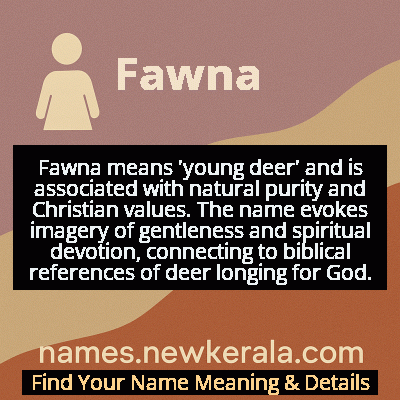Fawna Name Meaning & Details
Origin, Popularity, Numerology Analysis & Name Meaning of Fawna
Discover the origin, meaning, and cultural significance of the name FAWNA. Delve into its historical roots and explore the lasting impact it has had on communities and traditions.
Name
Fawna
Gender
Female
Origin
Christian
Lucky Number
9
Meaning of the Name - Fawna
Fawna means 'young deer' and is associated with natural purity and Christian values. The name evokes imagery of gentleness and spiritual devotion, connecting to biblical references of deer longing for God.
Fawna - Complete Numerology Analysis
Your Numerology Number
Based on Pythagorean Numerology System
Ruling Planet
Mars
Positive Nature
Generous, passionate, energetic, and humanitarian.
Negative Traits
Impulsive, impatient, moody, and can be overly emotional.
Lucky Colours
Red, maroon, scarlet.
Lucky Days
Tuesday.
Lucky Stones
Red coral, garnet.
Harmony Numbers
1, 2, 3, 6.
Best Suited Professions
Military, sports, philanthropy, leadership roles.
What People Like About You
Courage, energy, leadership, generosity.
Famous People Named Fawna
Fawna Brown
Poet
Published author known for nature-inspired poetry collections
Fawna MacLaren
Environmental Scientist
Leading researcher in wildlife conservation and habitat preservation
Fawna Johnson
Christian Educator
Developed nature-based Christian education programs for children
Name Variations & International Equivalents
Click on blue names to explore their detailed meanings. Gray names with will be available soon.
Cultural & Historical Significance
Extended Personality Analysis
Individuals named Fawna are typically characterized by a gentle yet resilient nature, combining sensitivity with inner strength. They often possess a deep connection to nature and demonstrate remarkable empathy toward both people and animals. Their personality reflects the name's origins - they tend to be nurturing and compassionate, with a strong sense of morality and purity of heart. Fawnas are often observant and intuitive, able to read situations and people with remarkable accuracy. They typically exhibit grace under pressure and maintain a calm demeanor even in challenging circumstances. While they may appear delicate, they possess an underlying toughness and determination that enables them to overcome obstacles while maintaining their core values of kindness and integrity. Their Christian upbringing often reinforces these traits, making them dependable friends and community members who lead by quiet example rather than seeking attention or recognition.
Modern Usage & Popularity
In contemporary times, Fawna remains a relatively uncommon but cherished name, particularly among Christian families who appreciate its natural and spiritual connotations. The name has seen a modest resurgence in recent years as part of the trend toward nature-inspired names, though it maintains its distinctive character. It's most popular in English-speaking countries, particularly in the United States and Canada, where it appeals to parents seeking a name that combines traditional values with natural beauty. While not ranking in the top 1000 names nationally, Fawna enjoys regional popularity in areas with strong environmental or Christian communities. The name's rarity adds to its appeal for parents wanting a unique yet meaningful name for their daughters. Modern usage often emphasizes the name's connection to both Christian virtues and environmental awareness, making it particularly appealing to families who value both faith and stewardship of nature.
Symbolic & Spiritual Meanings
Symbolically, Fawna represents innocence, gentleness, and spiritual purity. The young deer imagery evokes qualities of grace, vulnerability, and natural beauty, while also suggesting watchfulness and swift intuition. In Christian symbolism, the name connects to passages like Psalm 42:1 ('As the deer pants for streams of water, so my soul pants for you, my God'), representing spiritual longing and devotion. The name also carries connotations of new beginnings and growth, much like a young deer learning to navigate the world. It symbolizes the harmony between strength and gentleness, embodying the idea that true power often resides in quiet resilience rather than overt force. The name suggests a person who moves through life with purpose and grace while maintaining deep spiritual connections, reflecting the Christian ideal of living in the world but not being of the world.

